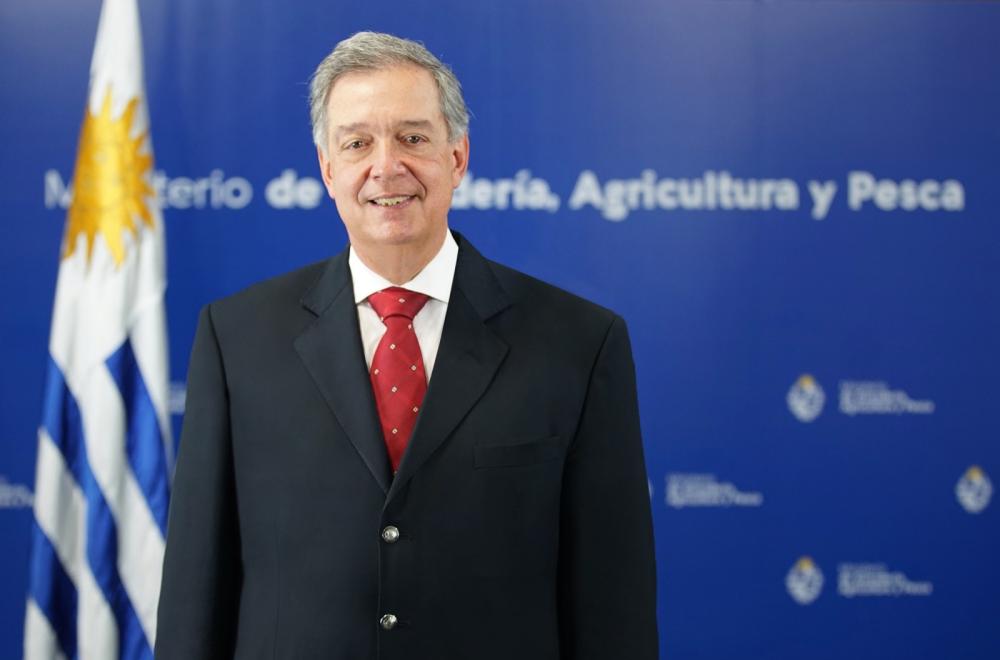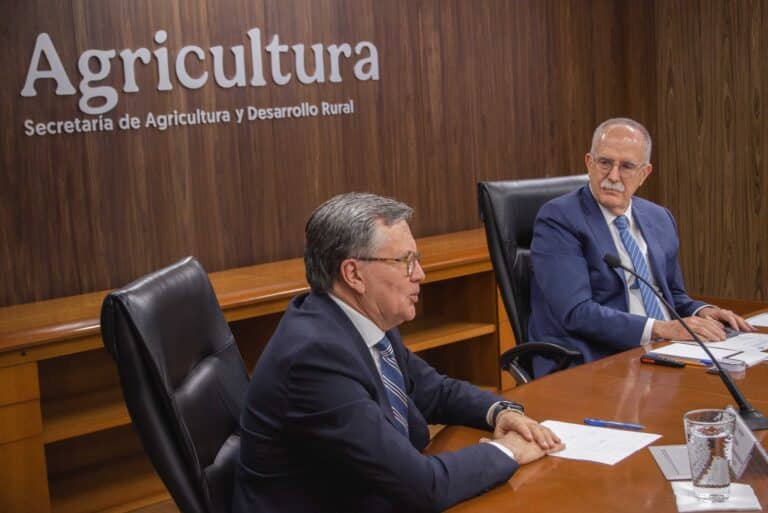Mattos observed that agriculture, which usually is not included in the discussions at the highest political level, is now high on the international agenda, thanks to Brazil’s Presidency of the G20 during 2024 and the holding of the United Nations Climate Change Conference (COP 30) in Belem do Pará in 2025.

Montevideo, 29 August 2024 (IICA). In recent years, the ministries of agriculture of the countries that make up the Southern Agricultural Council (CAS) have achieved a solid level of integration that represents a historic milestone and is destined to increase, given the international agenda with which the agrifood sector will soon have to contend.
This was the view expressed by the Minister of Livestock, Agriculture and Fisheries of Uruguay, Fernando Mattos, in reviewing his term as President pro tempore of the CAS, which concluded this year with important achievements.
Mattos observed that agriculture, which usually is not included in the discussions at the highest political level, is now high on the international agenda, thanks to Brazil’s Presidency of the G20 during 2024 and the holding of the United Nations Climate Change Conference (COP 30) in Belem do Pará in 2025.
“The CAS’s agenda includes huge challenges in areas such as plant and animal health and, of course, in biotechnology, which is key to our being able to achieve a leap in production. More and better production with less pressure on natural resources can only be achieved through biotechnological innovation, which is absolutely necessary. That is what the agreements that we signed while I was President pro tempore of the CAS are for,” Mattos said.
The CAS is a ministerial forum for consultation and the coordination of regional actions, made up of the ministers of agriculture of Argentina, Bolivia, Brazil, Chile, Paraguay and Uruguay. Its core objective is to define the priorities of the agricultural agenda and adopt positions on issues of regional interest. The Inter-American Institute for Cooperation on Agriculture (IICA) serves as the technical secretariat.
The Uruguayan minister underlined the CAS’s important role in enabling countries that have significant differences on other issues to achieve coordinated positions on agriculture: “Sometimes relations between our countries can get a little ‘noisy,’ but our remit is agricultural policy and we have to focus on that and ignore the differences. We always seek solutions through coordination and even promote the harmonization of the regulations of the different countries, which is very important to stimulate investment and promote international trade, which at present is quite seriously distorted.”
Mattos described the CAS as a valuable trusted space shared by the different areas of agriculture, which includes not only the ministers, but also a great technical team, which works and interacts in the different specialized areas and whose enormous support is key to ensuring that the efforts of the ministerial network are successful.
Agriculture, a pillar of peace
“Without food security, there can be no political, economic, or social stability. That is why we say that agriculture is essential for world peace and why we focus on production, for which the effects of climate change pose huge challenges,” Mattos explained.
He praised the CAS’s efforts to place on the agenda the fact that climate change is not generated in rural areas by agricultural activities, but in the urban centers of developed countries, which have pledged to make redress or support developing countries in tackling extreme climate phenomena with aid that has yet to materialize, despite the international commitments made.
“We have to continue working because it is vital for our countries to adapt. We see production systems becoming increasingly vulnerable, with climate variability exposing us more and more. This was demonstrated with extreme phenomena such as the fires in Chile, the droughts in Argentina, Uruguay and Paraguay, and the recent floods in the Brazilian state of Roo Grande do Sul,” said Mattos, who chairs the Inter-American Board of Agriculture (IABA), IICA’s highest governing body.
The Uruguayan minister explained that the impact of climate change is affecting the infrastructure of the CAS member countries, creating the need for special financing systems to deal with the damage caused. “Climate change is destined to get worse, with more frequent and more extreme phenomena, so we must develop different capabilities,” he commented.
“We must think about establishing funds for dealing with natural disasters in the future. We need have the funds available to provide adequate responses to the damage caused, because what we do at present is divert resources from national budgets earmarked for other areas such as education, public security and health. Obviously, in order to serve the productive sectors of our countries, whose relative weight is huge, we need to create resource management systems and also more developed insurance systems. The issue is serious because small farmers are the most exposed to climate risk due to issues of scale and access to technologies.”
Working groups
The CAS has a network of regional technical support groups that underpin and implement ministerial decisions.
The six working groups have been very active during Mattos’s Presidency, as have the Southern Cone Plant Health Committee (COSAVE) and the Southern Cone Standing Veterinary Committee (CVP), which coordinate work on animal and plant health at the regional level.
“Both COSAVE and the CVP have faced enormous animal and plant health challenges during my time as President pro tempore, such as avian influenza and swine fever. We addressed the challenges by seeking better coordination and technical exchanges with the countries of the region,” the minister remarked.
The minister also highlighted the CAS’s support for the candidacy of Argentine veterinarian Luis Barcos for the post of Director General of the World Organization for Animal Health (WOAH) during his term as President pro tempore: “Though we failed to achieve our main objective, we sent a very clear signal to the animal health oversight body regarding the importance of the Americas as a bloc that must be taken into account with respect to policies and domestic regulations for international trade in animal-based products.”
Mattos also highlighted the CAS’s participation in international forums -supported by IICA in its role as the technical-administrative secretariat-, especially in the most recent Conferences of the United Nations Framework Convention on Climate Change (COP 27 and COP 28).
“We were present in both Sharm-El-Sheik and Dubai, defending the key role of the region’s agricultural production. In those global forums, we showcased the progress our region has made with climate change mitigation and adaptation, and participated in the international trade discussions, since the intention is to introduce environmental factors as triggers for trade rules,” Mattos explained.
The minister also gave details of the work carried out to demonstrate the sustainability of the region’s production systems in response to the European Union’s Regulation 2023/1115, under which countries are required to certify that the primary products they export do not come from deforested areas.
“We are advocates of sustainable production, but at the same time we are working to counteract the non-tariff barriers some wish to impose on agricultural trade,” he said.
“We addressed many issues,” Mattos concluded, “but basically what we did was strengthen the relationship between the ministries and the teams of the different countries, working in a very professional manner together with the IICA technical secretariat, which has been an enormous support.”
More information:
Institutional Communication Division.
comunicacion.institucional@iica.int











